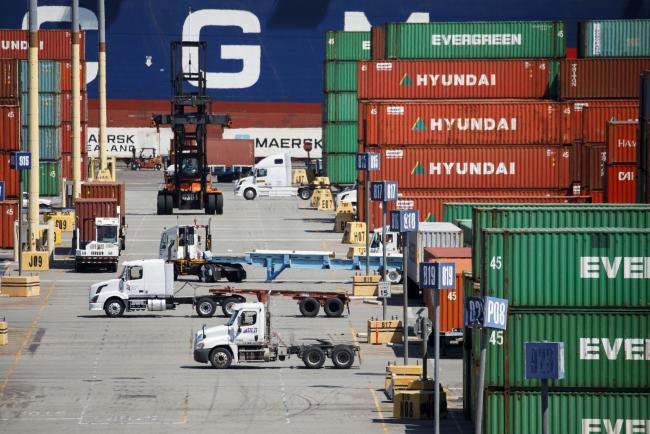(Bloomberg) -- Now is a good time to start worrying about that trade deal.
No, nothing bad has happened yet. There has in fact been many signs of progress. White House economic adviser Larry Kudlow described negotiations as coming down to “the short strokes,” China’s chief trade negotiator says he’s “cautiously optimistic,” both sides have lowered barriers on poultry imports and the U.S. extended exemptions for American companies doing business with Huawei.But that’s the problem. The outlines of a phase-one trade deal are appearing more solid by the day and if recent history is a guide, this is when things go wrong.
The first example was back in May 2018, when Chinese Vice Premier Liu He traveled to Washington and seemed to strike a deal to avoid tariffs. That didn’t stick of course. President Donald Trump decided to go ahead with levies, leaving Beijing to fume about American flip-flops.
A replay occurred in May this year. Trump again raised tariffs on Chinese goods as the two sides appeared to near a deal, but this time it was Washington that accused Beijing of going back on previously agreed to terms.
Here we are again? Negotiators appear to be making progress on a deal, with it emerging this week that the sides are talking about how to determine the magnitude of tariff roll-back that a phase-one deal might include. But there are now fresh obstacles.
House Speaker Nancy Pelosi has sent Trump legislation supporting Hong Kong protesters, and the president is expected to sign the bill into law. Beijing, which has publicly pledged retaliation, will find it difficult not to follow through. Whether that combination is enough to derail a trade deal is an open question.
Hong Kong
Hong Kong in the past week has seen some of its most dramatic scenes yet as police confronted protesters who’d fortified themselves inside a university campus. They included burning barricades, flaming Molotov cocktails and violent clashes between police and protesters. The scenes also renewed worries that further escalation could prompted the mobilization of Chinese soldiers, concern that was further fanned when members of the People’s Liberation Army garrison in the city emerged to help clean up local streets.
Share Sale
The turmoil that’s gripped Hong Kong for almost half a year didn’t stop Alibaba (NYSE:BABA) from moving forward with an enormous share sale this week. The Chinese e-commerce giant raised about $11 billion in Hong Kong’s largest listing since 2010. It could swell Alibaba’s cash pile to $44 billion, about twice as much as fellow Chinese tech titan Tencent has. Some of the places that money could go include investing to grow the company’s business in Southeast Asia or to bolster its efforts in technologies such as Artificial Intelligence.
‘Foothills of a Cold War’
Trade tensions, a shaky outlook for the world economy and the risk of a catastrophic conflict dominated discussions on the first day of the Bloomberg New Economy Forum in Beijing. Former U.S. Secretary of State Henry Kissinger said the U.S. and China were in the “foothills of a Cold War,” and warned that the conflict could be worse than World War I if left to run unconstrained. Microsoft Corp (NASDAQ:MSFT). founder Bill Gates said he was “more passionate about the value of engagement than ever” and worried about those promoting a U.S.-China decoupling. He didn’t see how such bifurcation would be feasible in the technology sphere, where research is published across geographical boundaries. “AI is very hard to put back in the bottle,” Gates said. The New Economy Forum is being organized by Bloomberg Media Group, a division of Bloomberg LP, the parent company of Bloomberg News.
Lending Costs
China’s central bank this week continued its efforts to lower the cost of lending. In addition to cutting its loan prime rate, the People’s Bank of China offered money to financial institutions at a lower cost through its medium lending facility and also its short-term open-market operations. And why not? A slew of data released this month have pointed to continued weakness in the economy. But it’s not as simple as that. The PBOC must balance its desire to stabilize the economy with the need to manage the country’s substantial pile of debt. Getting that balance wrong could portend dire consequences.
What We’re Reading
And finally, a few other things that caught our eye:
- How Apple (NASDAQ:AAPL), Trump and the trade war collide.
- Chinese parents are testing their children’s DNA.
- Hong Kong protests spur some to shun public schools.
- How well has Apple’s new iPhone been selling in China?
- The deadly swine fever closes in on a top supplier of pork.
To contact the editor responsible for this story: Malcolm Scott at mscott23@bloomberg.net
©2019 Bloomberg L.P.
